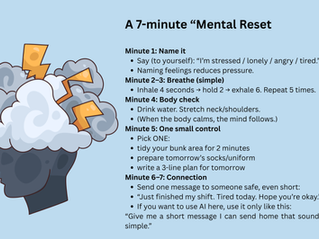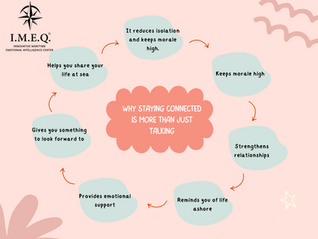The Clinical Assessment
- Feb 22, 2017
- 6 min read
OVERVIEW OF THE CLINICAL EXAMINATION
The goal of the IMEQ TEST is not psychiatric diagnosis, but instead a determination of whether candidates have mental or emotional conditions that would probably and substantially impair their performance of essential job- related functions with or without reasonable accommodation. In light of the stressful psychosocial factors on board that may or could impede specific job performance , it is essential that necessary precautions be taken to ensure the safety of the crew and the vessel .
Recommendations under the current guidelines of IMO and ILO regarding medical examinations and certification does include a brief assessment of mental health issues and problems, that a) may become apparent from exploration of the person's past medical history b) be suspected because of the responses to questions elicited during the assessment or c) may have been passed on to the examining doctor by a third party prior to the assessment. The purpose of the assessment is not to conduct a formal psychiatric diagnostic interview but to explore all the available information and the intuitive perceptions of the clinician to decide whether there is significant impairment, what its consequences are likely to be and to determine the need for a more specialized report before deciding on fitness.
However there are two major issues at stake; a) Questioning about mental ill-health can be traumatic for the person being assessed and it is applicants may be dishonest about disclosing information since it may jeopardize their chances of being hired and b) appointed general practitioner performing the medical examination may lack appropriate psychiatric training to discern possible mental health issue that could affect safety of the crew onboard, the vessel and the applicant whose exposure to stressful conditions may exacerbate an existing mental health issue.
In light of the above , IMEQ developed set of validated standardized and non standardized procedures specific enough to assess current mental state and mood, relative to safety onboard in light of the intrinsic psychosocial risks involved on the job. Comprehensive Psychological Evaluations have been applied in a number of high risk or stressful occupations such as in the police force , aviation or high security occupations but not in seafaring, despite research findings of higher rates of suicide , depression and anxiety reported, no specific guidelines regarding psychometric testing has been established or regulated as of to date.
It is our social responsibility that fitness for duty should be applied to all seafarers boarding the vessel to ensure personal, crew and vessel safety . In addition IMEQ has established an immediate crisis response center and a counseling center that offers immediate and short term individual counseling for seafarers. Our clinicians and associates are trained and certified in our model and specialized to address the needs of this population.
LEGAL ISSUES
Under the Americans with Disabilities Act (1990), an employer may ask disability-related questions about a job applicant’s physical and/or mental condition but only after the employer makes a conditional offer of employment to the job applicant. This helps to ensure that the employer does not exclude the applicant with a possible hidden disability before the employer evaluates the applicant’s ability to perform essential job-related functions.
This examination takes place after a conditional job offer and consists of tests such as the Minnesota Multiphasic Personality Inventory-2 (MMPI-2), which may lead to confirmation that the candidate has a diagnosable mental or emotional disorder as specified by the DSM-IV-TR (American Psychiatric Association, 2000).
Psychologists should consider a test battery that provides results beyond an assessment of psychopathology because the number of candidates rejected solely on the basis of results from a psychological assessment tends to be small (Md = 5%; Cochrane et al., 2003). For example A psychologist evaluating fit for service in the police force, may administer a number of tests to identify mental conditions and attributes or traits relevant to the job. Therefore, a battery of tests provides a better snapshot of a candidate’s mental and emotional conditions from which a psychologist can infer a candidate's potential approach to job activities on board, effectively deal with the stressors intrinsic to the job and cope under stressful conditions . This battery also facilitates a preferred selection strategy of selecting-in the “good candidates” who demonstrate desirable behaviors and attributes and screening-out the “less good” candidates who demonstrate undesirable behaviors and attributes (Benner, 1986). Moreover combining information from different psychological tests to improve the prediction of job performance, when the selected battery of tests are empirically tested , validated and reliable measures of the constructs being assessed.
Most importantly, of course, psychologists conducting IMEQ TEST should “...use assessment instruments whose validity and reliability have been established for use with members of the population tested” (APA, 2002, p. 1071; Standard 9.02b Use of Assessment). “When such validity or reliability has not been established, psychologists describe the strengths and limitations of test results and interpretation” (APA, 2002, p. 1071; Standard 9.02b Use of Assessment) in their psychological reports.
A comprehensive understanding of the job requirements is also a necessary part of psychologists’ decision-making process and selection recommendation. The psychologist evaluates the candidate’s data in terms of the individual’s suitability for performing essential job duties (See APA [2002]. Knowledge about seafaring may come from a job- task analysis, interviews, surveys, or other applicable sources that identify behaviors and attributes that contribute to anticipated job performance success and difficulties.
At IMEQ the use of standardized tests to determine qualities essential to job function and job analysis/profiling to identify traits relevant to particular positions on board ensures safety and success on board.
Ultimately, psychologists generally make a selection recommendation that may be a simple dichotomy between qualified and unqualified. The designation of qualified means that the candidate’s psychological makeup is such that he or she is unlikely to be substantially impaired in performing essential job-related tasks with or without reasonable accommodations. The designation of unqualified means that the candidate presents with mental or emotional conditions that are likely to substantially impair him or her or crew members therefore jeopardizing safety on board.
As an alternative to the qualified/unqualified dichotomy at IMEQ we apply a Likert-type evaluative scale with descriptors such as follows: (1) poor suitability, (2) fair suitability, (3) good suitability, (4) very good suitability, or (5), excellent suitability .
In line with the applicable ethical guidelines (APA [2002], a psychological report should contain information regarding the benefits and limitations of the psychological screening procedures to help the hiring authority make informed and realistic selection decisions. The report should contain only essential information dealing with the referral question, namely whether the candidate has mental or emotional conditions that would probably and substantially impair him or her from performing essential job-related functions with or without reasonable accommodations.
Psychologists conducting IMEQ TEST must be exceptionally well versed about and sensitive to the ethical issues, challenges, and dilemmas inherent in this form of professional work. They must attend to (1) who is the client and (2) what are the relationships among all i
ndividuals involved. In addressing these questions, psychologists must keep in mind that there are several stakeholders who have an interest in the assessment of psychological suitability: the hiring authority, in this case the maritime company, the candidate, the psychologist, the psychology profession, and the community. Each of these stakeholders shares some interest, directly or indirectly, in the selection of a psychologically suitable seafarer candidate.
Before beginning the assessment, the psychologist has a responsibility to carefully explain to the candidate and to the hiring authority who the client is and what the relationships are among all parties involved.
Using a comprehensive Informed Consent statement, the psychologist takes the necessary steps to ensure that the candidate understands the nature of the assessment, the possible outcomes, and the fact that the psychologist works for the hiring authority . The psychologist solicits informed consent from the candidate, and does whatever is necessary to ensure that the candidate has an opportunity to ask questions and receive answers (APA, 2002; See Standards 3.10 Informed Consent and 9.03 Informed Consent in Assessment). Specifically, details should include an identification of the hiring authority as the client (e.g., consent to the procurement of a report), the nature of the assessment (e.g., personality, psychopathology, normal psychological functioning, employment skills, cognitive abilities), the procedures and testing format (e.g., written self-report tests, oral interview), the duration of the assessment (e.g., hours or multiple sessions), the purpose of the assessment (e.g., employment decisions), the period of time for which the assessment results are valid (e.g., one year or a legally prescribed period), the method of communicating the results of the psychological assessment (e.g., a written letter, access to the written report and, or formative feedback from the psychologist), a right right to appeal a psychological disqualification or obtain a second opinion if permitted by law or the hiring agency, and the limits to confidentiality and to whom the psychologist will provide results of the assessment (e.g., the EMPLOYER ) (APA, 2002, Standards 3.07 Third-Party Requests for Services and 9.03 Informed Consent in Assessment; IACP Psychological Services Section, 2009; Fisher, 2009). If the hiring authority’s practice is to deny a disqualified candidate access to the psychological report or individual feedback from the psychologist, this should be stated in the informed consent. The disqualified candidate may still appeal the psychological determination and/or file a complaint on the basis of discrimination, for example, with the state licensing board or with the Court.






































































































Comments